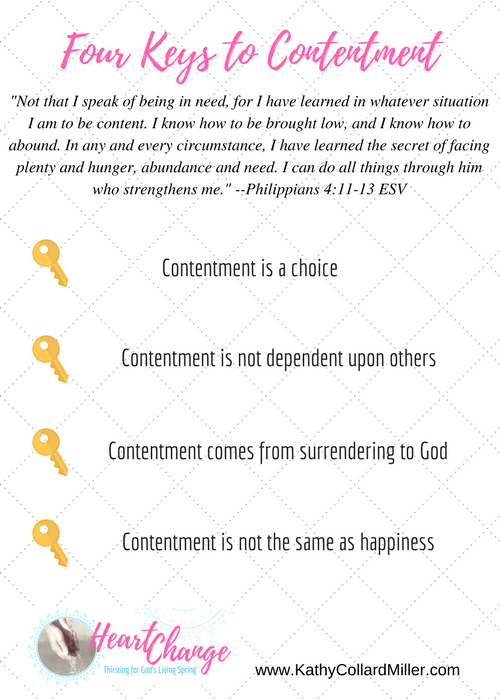 Have you ever thought, “If only I didn’t have these problems, I could be the peaceful person God wants me to be”? Or “If only people would cooperate, I could have contentment and peace”?
Have you ever thought, “If only I didn’t have these problems, I could be the peaceful person God wants me to be”? Or “If only people would cooperate, I could have contentment and peace”?
At times we believe contentment is based upon diminishing, even eliminating, our problems. TWEET THAT!
In years past, I thought the only way I could be content with life, people, even myself, was to be free from problems. So my thoughts often rehearsed:
-
If my husband will just not work so many hours and help me at home, I can be content.
-
If my toddler will obey, I can be content.
-
If no one interrupts my schedule–like my kids– I can be content.
-
If my co-worker would treat me right, I can be content.
But the Apostle Paul’s words counteract that: “Not that I am speaking of being in need, for I have learned in whatever situation I am to be content. I know how to be brought low, and I know how to abound. In any and every circumstance, I have learned the secret of facing plenty and hunger, abundance and need. I can do all things through him who strengthens me.” ( Philippians 4:11-13 ESV)
It wasn’t until I let God work those truths in me that I grew contented. You can too.
Here are four ideas for becoming more content: TWEET THAT!!
1. Contentment is a choice.
Paul said he “learned” contentment. That indicates a thoughtful involvement through a change of heart. When I was discontented, I thought peace only came through other people making loving choices. I learned from Paul’s words contentment is something I could choose and grow in. I began depending upon God to empower me to take responsibility for my choices, rather than blaming others or begging Him to make others change. As a result, I became more contented little by little.
2. Contentment is not dependent on others.
Paul doesn’t even mention other people. He uses “I.” We know the Apostle Paul had lots of interactions with uncooperative, even hateful, people. People tried to ruin his ministry. He was beaten, imprisoned, misunderstood, slandered, and many other very hurtful things. Yet he didn’t blame those things or people.
Unfortunately, I didn’t learn that quickly and my discontent birthed anger, depression, and bitterness because people weren’t cooperating with my needs. But finally, I realized contentment comes from knowing God can change me and I can’t change anyone else. Only He can change others.
3. Contentment comes from surrendering to God.
Paul doesn’t demand his life must be a certain way. He trusts whatever God had for him: plenty, hunger, abundance or need. He believed God loved him and wanted only the best for him. That surrender enabled him to receive God’s strength.
Basically, discontent is telling God, “You don’t know what you’re doing. You don’t love me. I demand things be different.” I communicated my distrust of God through my demand that my husband meet my needs, my child obey thus making me look good, and everyone respect my schedule.
But when I truly believed God loved me, that set me free from demanding God do it my way. He knew best!
4. Contentment is not the same as happiness.
Paul didn’t say anything about happiness. Happiness is based on circumstances but contentment and joy can be chosen.
Happiness is something that happens to you but contentment is a heart attitude you choose. TWEET THAT!
These four truths began to transform my thinking. I actually did become content. My thoughts became,
-
“Even if Larry never changes, I can be the contented woman God wants me to be.”
-
“Even if my child disobeys in public, God knows I love and discipline her.”
-
“Even if people don’t respect my schedule, God has a better plan in the interruption.”
Now, many years later, my husband and I just celebrated forty-seven years of marriage and we couldn’t be happier. I have wonderful relationships with my children. Although my schedule still gets interrupted, God is fulfilling His plan.
It really is possible to be content!
